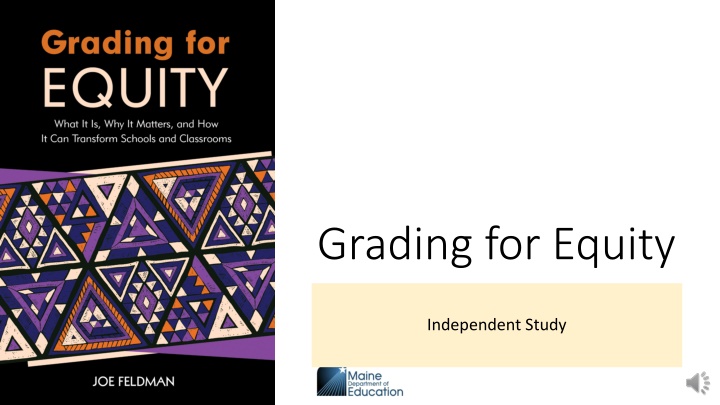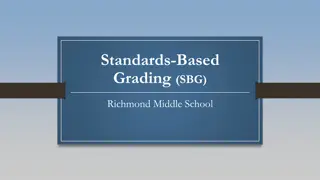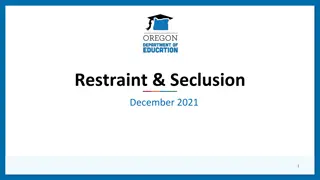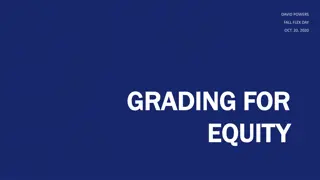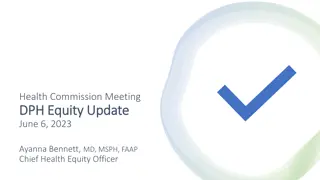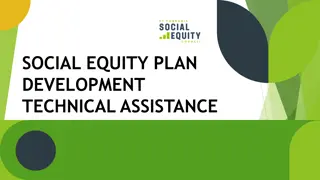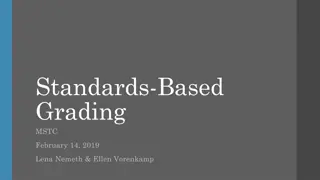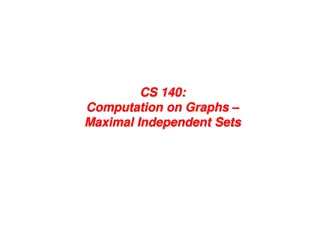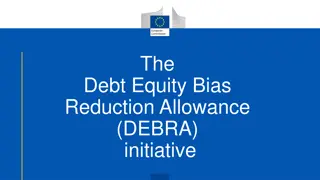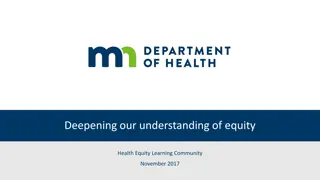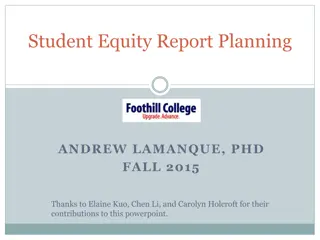Grading for Equity Independent Study Program
Explore the concepts of equitable grading with a focus on historical context, bias recognition, and motivational elements. Join thought partners in studying Joe Feldman's book to transform grading practices for all students. Engage in live facilitated discussions and sessions to delve into the principles of equitable grading.
Download Presentation

Please find below an Image/Link to download the presentation.
The content on the website is provided AS IS for your information and personal use only. It may not be sold, licensed, or shared on other websites without obtaining consent from the author.If you encounter any issues during the download, it is possible that the publisher has removed the file from their server.
You are allowed to download the files provided on this website for personal or commercial use, subject to the condition that they are used lawfully. All files are the property of their respective owners.
The content on the website is provided AS IS for your information and personal use only. It may not be sold, licensed, or shared on other websites without obtaining consent from the author.
E N D
Presentation Transcript
Grading for Equity Independent Study
Grading for Equity by Joe Feldman Why study equitable grading? Instruction has changed a great deal in the last 100 years, but many of our current grading practices are rooted in 19thcentury institutional practices. If we are going to change our systems of practice to be more equitable for all students, we must understand all the facets of our grading traditions.
Feldmans book presents a logical starting point to create a common foundation for rethinking practices. 1. Understand the history of grading and the call to action. Text-Based Study 2. Explore the mathematical accuracy of our grading systems 3. Recognize bias and anti-bias practices in grading 4. Find the motivational elements of grading that provide students with agency and voice in their learning.
How to study While solo is fine, it helps to have thought partners. Work with your department or PLC or reach further. We know how to work from a distance! Study the first part of the book six chapters. Choose one pillar to study deeply. What is your biggest need or where do you see an opportunity to try something different?
Getting started Order the book Grading For Equity: What It Is, Why It Matters, and How It Can Transform Schools and Classrooms
Check out our syllabus Link to syllabus Each session is facilitated by a teacher who has previously studied the book and tried something as a result of the study. The recordings may be viewed before reading to set a purpose or after to help process. The recordings were made during live sessions which included breakout discussions. Pause at each breakout opportunity (edited out of these recordings) and discuss with a partner or record thoughts in a learning journal.
DOE Support for Study Join a live session to process Tuesday, October 4 or Thursday, October 6 3:30 5:00 Facilitated discussion of equitable grading: history and call to action See syllabus for link to event registration.
DOE Support for Study Join a live session to process Tuesday, December 6 or Thursday, December 8 3:30 5:00 Facilitated discussion of equitable grading: accuracy See syllabus for link to event registration.
DOE Support for Study Join a live session to process Tuesday, February 7 or Thursday, February 9 3:30 5:00 Facilitated discussion of equitable grading: anti-bias practices See syllabus for link to event registration.
DOE Support for Study Join a live session to process Tuesday, March 7 or Thursday, March 9 3:30 5:00 Facilitated discussion of equitable grading: motivation See syllabus for link to event registration.
Other resources Books, blogs, podcasts, articles, and other resources are available as well. Click here for a spreadsheet of resources. Questions? Contact Beth.Lambert@maine.gov
